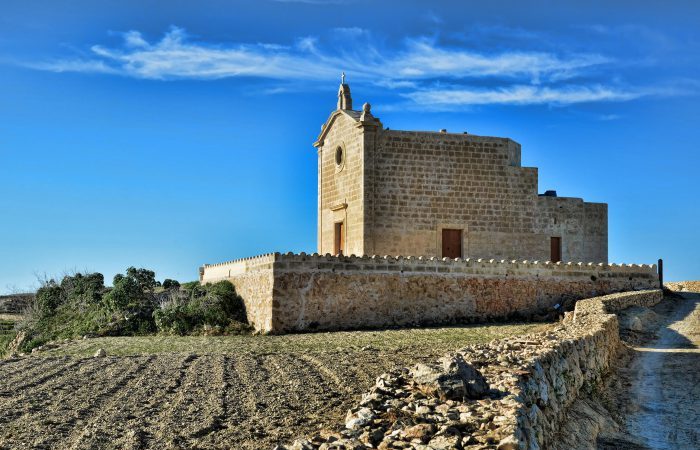The Planning Authority has ignored warnings by the Superintendence for Cultural Heritage and has approved a fireworks factory just 300 meters away from the legendary San Dimitri chapel.
The St Demetrius chapel is an early 15th century chapel that was rebuilt in 1736 just outside Gharb, close to the cliffs of Ras San Mitri (the Cape of St Demetrius).
According to Gozitan folklore, a woman called Zgugina went to this chapel to pray for her son’s safe return after he was abducted by pirates. Kneeling before a portrait of San Dimitri, she made a vow to keep an oil lamp (musbieh) burning day and night until her son’s return. Answering her prayers, San Dimitri leapt from the portrait on his white horse and rode to the pirate ship over water. He fought the pirates and brought her son safely home.
The fireworks factory will be build over 5000m2 of agricultural land, and will consist of 6 stores, emergency shelters and a reserviour.
The Superintendence had warned that the fireworks factory poses a real threat to the integrity of the historic chapel located less than 300 metres away from the proposed site and that it would negatively impact the landscape. It also warned that the proposed development will be visible from various parts of Gozo, including Ta’ Gordan lighthouse and its surroundings.
In its objections, the Superintendence called for a Risk Assessment Report to clearly assess the risk to San Dimitri chapel. It also called for the imposition of guarantees in order to protect and safeguard it in case of an accident.
However, the SCH were re-consulted once the architect’s justifications and clarifications were received and no reply was then submitted within the stipulated time. This was interpreted by the case officer as a no objection for the approval of the factory.
“Therefore, it is being considered that the SCH has ‘no objections’ to the proposed works,” wrote the case officer in his report recommending approval of the proposed development.
NGO Wirt Ghawdex also called for the refusal of the application, noting that it raises strong concerns of a negative impact on the surrounding environment, in particular its proximity to the historic chapel.
A 2014 policy regulating fireworks factories allows the development of fireworks factories on agricultural land as long as this is registered as being “dry,” as confirmed by the Agriculture and Rural Payments Agency.
The application proposes a brand new fireworks factory complex.
Following several meetings and site inspections, this application was given the green light by an ad hoc committee that assesses the technical aspects for new fireworks factories before they get Planning Authority approval.
The report from the committee, which is chaired by Police Inspector Sandro Camilleri, fails to refer to any dangers posed to the historic chapel, focusing rather on the design and layout of the site with the aim of maximising health and safety for both the workmanship and third parties.
Concerns were raised by the Environment and Resources Authority due to the overspill of buildings and land take-up in the ODZ. These concerns were taken into consideration by the committee.
Fireworks enthusiasts who talked to The Shift insist that a genuine need exists for fireworks factories in Gozo because the island currently has to rely on fireworks imported from Malta. When the new policy was approved in 2014, there were 35 licensed fireworks factories in Malta but only one in Gozo.
But the PA has already approved two fireworks factories in Gharb, with two more factories being proposed in the village. Two other fireworks factories are also proposed outside development zones in Kercem and Qala.
Another factory on another site in the vicinity of the chapel was also approved in 2007. On that occasion the applicants were asked to insure the nearby chapel against the eventuality of damage caused by a possible explosion. At the time this led Planning Ombudsman Joe Falzon to question the permit by asking: “If there is no danger to the Chapel of San Dimitri, why insist on an insurance policy? If, on the other hand, there is a danger, no amount of insurance money can replace a historical monument.”














